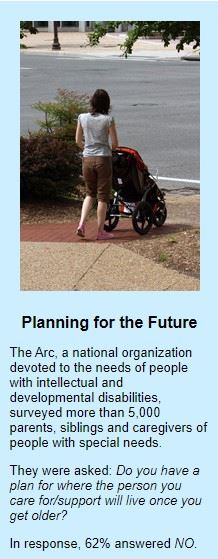Estate planning is always important — but it takes on even greater importance if you have a special needs child who is not expected to be financially independent. The parents of children with autism, Down Syndrome, mental illnesses and physical or intellectual disabilities are best suited to understand the unique issues facing their sons and daughters. However, the current daily struggles of caring for their children are often so great that parents find it difficult to think about the future.
 Taking the first step in planning can start by asking the question:
What would happen to my special needs child if I died without an estate plan?
Taking the first step in planning can start by asking the question:
What would happen to my special needs child if I died without an estate plan?
If you die without a valid will, (intestate, in legal language), state law will dictate who inherits your assets. The laws vary from state to state and generally depend on whether a deceased person has a surviving spouse, children, siblings or other relatives.
Keep in mind that the rules of intestacy are inflexible. Although they may wind up reflecting your wishes (if you had formalized them), it is also possible the end result would be something you find objectionable. For example, let's say you have three children including one with special needs. Without a will, your assets may be divided equally among your children — when perhaps you believe that would be inequitable because the special needs child may need them more.
In court proceedings, a guardian ad litem will generally be appointed to represent the interests of a special needs child, a minor, a disabled or incapacitated person. The guardian ad litem may be a relative or an attorney and will help represent the best interests of the child.
In other words, if parents with a special needs child do not take specific steps to plan for the future, the court system will decide how to distribute their assets and how their child will be cared for. That should provide incentive to act now.
If a court legally distributes your assets to your child (and any other children), the amount may jeopardize his or her ability to receive Medicaid and other government benefits. Assets of more than $2,000 can cause an individual to be disqualified for benefits.
In addition to legally naming a guardian for your child, you can also take other estate planning steps, such as setting up a special needs trust or a supplemental needs trust. These trusts are designed to "supplement, not supplant" the benefits provided by Medicaid and other government assistance programs. The trust can be the beneficiary of the money you would like your special needs child to inherit. It can also be the recipient of life insurance proceeds.
The bottom line is that with a special needs trust, you can provide for your child's reasonable living expenses. They can be used for a variety of needs such as equipment, education, transportation, a computer or higher quality of medical or dental care than is provided with government benefits.
What about Leaving Money to a Sibling?
Some parents leave money to a sibling with instructions that it should be used to care for the special needs child. While this is well-intentioned, it can have unintended results. For example, the sibling could get divorced and some of the money for the special needs child could be given to an ex-spouse. The sibling could have a judgment filed against him or her and the assets left for the special needs child could be seized. Or the sibling could simply spend the money, rather than use it for the purpose instructed by the parents.
In these cases, a special needs trust would be a better choice. Keep in mind that estate planning for the future needs of a special needs child with a trust can be complex. Proper wording is critical to ensure your child is not inadvertently disqualified from receiving government benefits. This article only discusses some of the issues involved. Consult with your estate planning advisor to ensure your special needs child is cared for — even when you are no longer around to do it.

